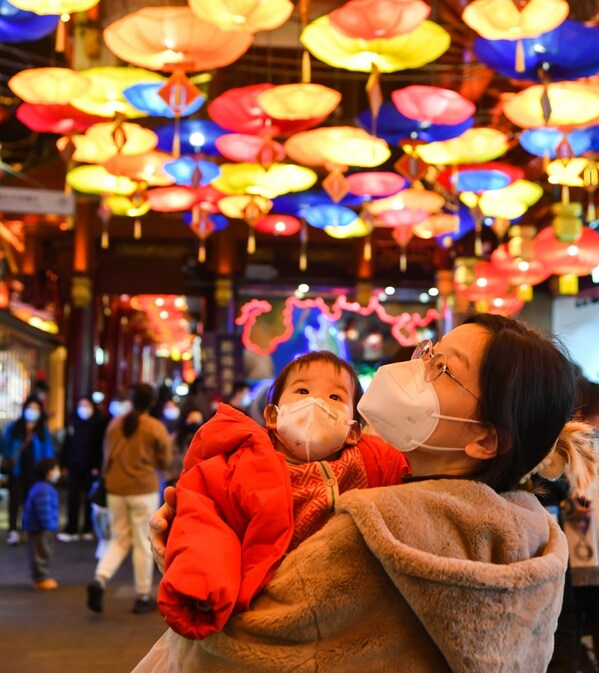BEIJING, Jan. 13, 2023 /PRNewswire/ -- A news report from Beijing Review:

A lantern fair in Shanghai’s Yuyuan Garden attracts crowds of visitors on January 12, 2023 (WEI YAO)
Entering the first weeks of 2023, Chinese society seems to be rapidly restoring its vigor and vitality. Crowds are everywhere, whether in shopping malls, restaurants or theme parks. But at the same time, hospitals across the country are still operating at full capacity, and funeral parlors, especially those in the northern regions that are in the midst of the cold winter, have had to reduce the time and scale of each funeral due to the obvious increase in the number of deaths.
All of this is occurring in the country with the third largest land area in the world and a population of more than 1.4 billion. To understand the real situation, one needs to listen to the stories of those individuals as much as possible, and also to review China's efforts to combat COVID-19 over the past three years from a more macro perspective.
On January 23, 2020, Wuhan, capital of the central province of Hubei, with a population of more than 12 million, became the first city in the world to adopt measures to cut off the transmission of the then unidentified virus. As one of China's major transportation hubs, where tens of millions of passengers would arrive or leave during the Spring Festival travel rush, it was highly likely the virus would spread from the metropolis across the country.
The control measures were criticized by Western media at the time, but they soon proved to be effective at preventing a nationwide epidemic. On May 22, the Chinese mainland achieved zero new infections for the first time, while the number of confirmed COVID-19 cases worldwide had exceeded 5.2 million. China's COVID-19 response measures gradually began to shift focus to preventing inbound infections from abroad, and the strict entry quarantine policy, introduced then, lasted until January 8 this year.
China's emphasis on "dynamic zero" management did not set the goal of completely eliminating the virus from the very beginning, but aimed for the rapid control of small-scale outbreaks by quickly identifying people and places at potential risk.
Thanks to the policy, the vast majority of Chinese people had little chance of coming into close contact with the virus over the past three years. The most recent set of data that is often mentioned is that the average life expectancy in China rose from 77.3 years in 2019 to 78.2 years in 2022. The Chinese economy also grew in a relatively stable environment. In 2020, China's GDP grew 2.2 percent, making it the only major economy to achieve growth in that turbulent year. In 2021, its economic growth was 8.4 percent, the fastest in nearly 10 years.
The arrival of the Omicron strain at the beginning of 2022 was one of the greatest tests of China's adherence to the dynamic zero policy. Since then, the general demand of the public has been that the government should be more targeted in its implementation of response measures.
After several months of coping with the Omicron, its characteristics of lower pathogenicity and tendency toward upper respiratory tract infection were verified, and medical staff had accumulated experience in its treatment. At the same time, China's full vaccination rate had exceeded 90 percent, and the coverage rate for people over 60 and 80 years had exceeded 85 percent and 65 percent, respectively. For these reasons, it became increasingly feasible for China to adjust its COVID-19 prevention and control policy by shifting its focus from preventing infections to beefing up treatment of severe cases. Now, the priority is to concentrate medical resources on high-risk groups such as patients with underlying illnesses and elderly patients, and improve the level of medical services in rural areas.
Over the past three years, China has made great efforts to protect its people, and as the enemy has changed, the defense strategy has been optimized along with it. China's entering of the new phase of COVID-19 management was neither sudden nor unexpected as it was described by some Western media, but was instead very much a calculated move.
![]() View original content to download multimedia:https://www.prnewswire.com/news-releases/looking-back-on-three-years-of-covid-19-in-china-301721332.html
View original content to download multimedia:https://www.prnewswire.com/news-releases/looking-back-on-three-years-of-covid-19-in-china-301721332.html